 |
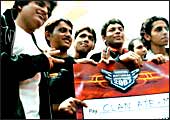 |
| A virtual world: Visitors playing games
at the expo (top); and winners of the Gamebox National Championship
2007 |
JANUARY 26-28, 2007
SKOAR 2007 (Gaming Expo), Hall No. 12,
Pragati Maidaan, New Delhi
Troggy-eyed
and under-slept, I make my way towards a nondescript hall at New
Delhi's Pragati Maidaan. I am here, (a can of cola and my cynical
mate, Alter Ego, in tow), for SKOAR! 2007, the third in a series
of annual gaming expos (the first in the capital). "Oh, it's
just another jamboree, one where they hard sell myths," offers
Alter Ego, implicitly urging me to let him do my job for me. I
usually am wont to giving in to his protestations, for reasons
that go beyond mere constitutional propriety. Truth be told, I
am quite in awe of Alter Ego's sense of disdain for expos, where
every person behind every counter is out to convince you how your
august presence there will make the world a better place.
Not today. "Gaming is serious business,"
I tell him firmly, "so keep your idiosyncratic self occupied
elsewhere." And prima facie, I sure seem to have scored one
over him, for I see before me a sea of humanity-more than 3,000
people packed in a hall smaller than a football field; all ostensibly
gathered to abet the cause of virtual worlds. Worlds, not always
named innocuously, having their own set of rules, defined by a
set of code writers; call them mortals or 'God 2.0', it makes
little difference. Age too does not matter here; you can be king
at eight, it's all just about working your joysticks well.
"The response in Delhi has been better
than expected," L. 'Subu' Subramanyan, CEO, Jasubhai Digital
Media, (the publishers of SKOAR!), told me on Day One. "We
expect at least 40,000 footfalls by the end of the event."
And he wasn't way off the mark. During the three days I was around
there, the hall was packed to capacity, people jostling for space
at each of the 20-odd stalls. So, was this a sign that India has
taken to gaming big time? "We sure think so because in the
last one year alone people have gamed for more than one million
hours at our outlets," informs Sunil Buch, Head (Marketing
& Product Management), Reliance World, the retail arm of Anil
Ambani's Reliance Communications. To be fair, Buch's stall, which
was hosting the finale of Gamebox National Championship 2007,
by far the largest gaming contest in the country (they played
hosts to Fanatic, one of the top gaming teams in the world), was
thronging with participants and onlookers. And so was that of
Microsoft, which was showcasing its Xbox 360.
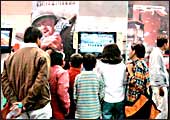 |
| All the rage: Spectators checking out
Xbox 360 |
But does that really mean that gaming in India
has arrived? "Gaming in the us, Europe and even Korea has
matured to a degree where people are making a living off it. India
is as yet a nascent market and players are sceptical, everyone
is just testing the waters," admits Shinoj K. Nambiar, Country
Manager, k2 Network, a us-based online gaming portal, which is
slated to launch services in India in the next couple of months.
That said, players are betting big money on all formats of gaming.
What they are gunning for is as yet only a $10-15 million (Rs
45 to 67.5 crore) market and there are few guesstimates on how
big it would be, say, by 2010. Buch and Nambiar reckon that mmorpg,
the massively multiplayer online role-playing game format they
operate in, will drive growth. Others like Rahul Datta of Microsoft
are of the view that console gaming has a future in India. "PC-based
games can never offer the kind of experience consoles offer,"
he says. "But at Rs 20,000 for an Xbox, with each game coming
for an additional Rs 2,000, would people really buy?" Alter
Ego pitches in, unable to take it anymore. Datta, though, wouldn't
say much, choosing to profess optimism.
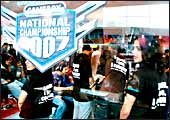 |
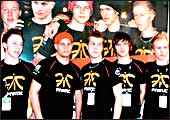 |
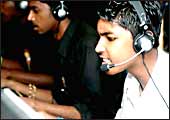 |
| Hooked: Reliance World hosted the Gamebox
National Championship (top left); Gaming team Fanatic (R);
and participants at the expo (bottom left) |
Alter Ego is already pontificating. "India
is an extremely price-conscious market and it wouldn't take to
any product unless it offers value for money," he says. Adithyaa
Srikanth, ceo, KrishCricket.Com, who has been watching Alter Ego's
theatrics, comes around in a bid to put things into perspective.
"It can take anywhere between $10 million (Rs 45 crore) and
$50 million (Rs 225 crore) just to develop a game, forcing vendors
to price them the way they do. What they need is scale, and the
only format that can presently offer it is the mobile phone,"
says Srikanth, who is the son of former India captain Krishnamachari
Shrikanth. Subu, however, has a different take: "The mobile
phone does offer scale, but it is a very non-serious format,"
he says and adds, "the future of serious gaming in India
really depends on the spread of broadband in the country, much
like it did in the us, Europe and Korea." Another problem
that vendors must grapple with is piracy. Although they cry hoarse
over a parallel grey market eating into their share of the pie,
some admit that its existence is actually helping their cause,
at least, for now. "In a perverse way, piracy has ensured
that many high-end games penetrate the mass market," admits
the CEO of a gaming portal.
And then there are social issues to contend
with. Privately many vendors admit that they have to work very
hard to beat the taboo factor, often associated with gaming in
societies such as India. "Unless we manage convincing mothers,
especially in small-town India, that gaming wouldn't affect their
kids' grades at school, we will not go very far," admits
a vendor. Moreover, these games are designed for and set in a
western milieu-for societies that tend to be individualistic unlike
India, where people like enjoying themselves in groups. Alter
Ego-speak: "Gaming is much more than just racing or shooting
your way through to the next level. It's a culture that takes
much more than just a three-day extravaganza to cultivate."
Alter Ego is right. If it were any easier, SKOAR! wouldn't be
troubling itself with a nationwide road show.
|










